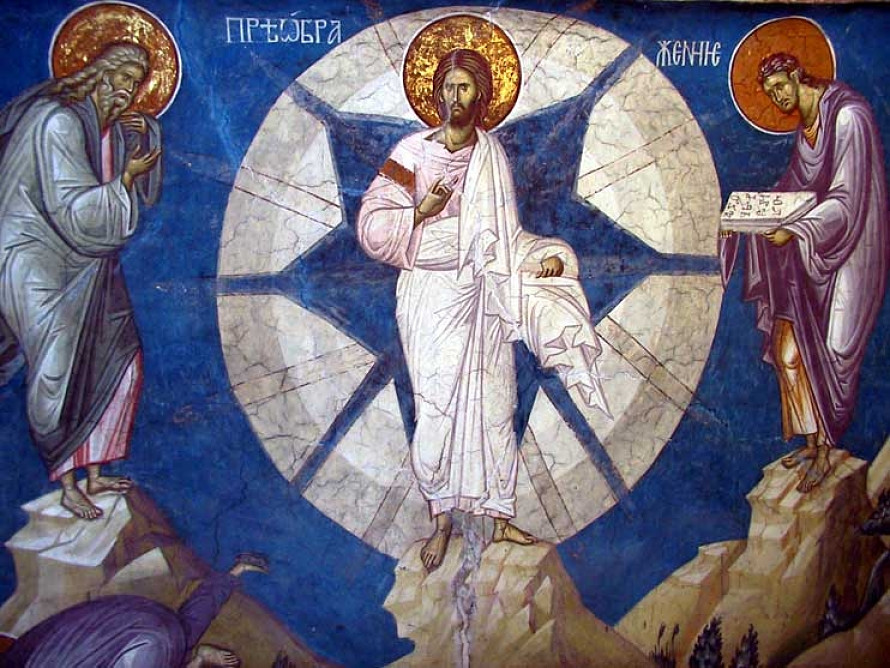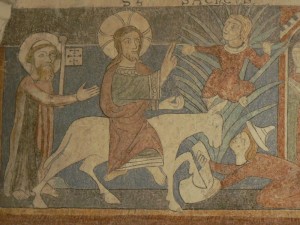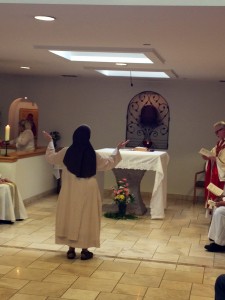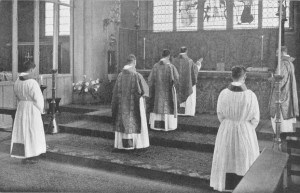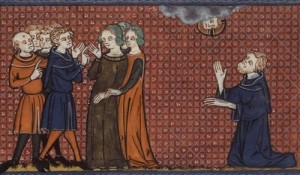 At this morning’s Mass we heard from the Prophet Malachi. If you don’t know about this minor prophet, I would spend some time with today’s first reading but also do some research to know more about Malachi. He’s a compelling voice.
At this morning’s Mass we heard from the Prophet Malachi. If you don’t know about this minor prophet, I would spend some time with today’s first reading but also do some research to know more about Malachi. He’s a compelling voice.
Dominican Father Jordan from New Haven’s Priory preached on the life of a favor saint of his, Saint Pelagia once the Harlot. An unknown saint of the Antiochene Church whose life clearly illustrates what Malachi is getting at, and opens up for us in the Mass prayers. The Church puts on our lips these ideas found in the Collect by addressing God the Father: “pour out your mercy upon us,” “pardon what conscience dreads,” and “give what prayer does not dare to ask.”
When the Communion rite is finished, the Prayer after Communion asks God for the grace to be “refreshed and nourished by the Sacrament … so as to be transformed into what we consume.”
Pelagia was dancer and actress known for her beauty. Tradition tells us that her early life was none-too-moral. But her story ends as you would expect: in the arms of the Lord. Let me say up front: Pelagia’s life is a narrative of mercy.
Where the majority of the bishops of the region wouldn’t speak with Pelagia but a bishop known for wisdom and holiness, Saint Nonnus, was willing get out of his comfort zone. Imagine that a bishop would recognize a woman’s natural beauty, and be able to admit it. But I digress. Key for me is what Pelagia said, “I heard the talk of Christians and I want to follow Christ.”
The hagiography reports a letter Pelagia sent to Bishop Nonnus that moved him. She writes,
To Christ’s holy disciple from the devil’s disciple, a sinful woman. I have heard that your God has bowed the heavens and come down to earth, not to save the righteous but sinners. Such was His humility, that He ate with publicans, and He upon Whom the cherubim dare not gaze lived among sinners and spoke with harlots. Therefore, my lord, since you are a true servant of Christ (as I hear from the Christians), do not spurn me who with your help seek to draw near the Savior of the world and to behold His most holy countenance.
[The saint’s biography (at the link above) is taken from The Great Collection of the Lives of the Saints, Volume 2: October, compiled by St. Demetrius of Rostov.]
Pelagia’s story is our story, but in truth, the narrative that all the saints give is our story. Hagiography shows the contours of grace and sin and final redemption (communion) by Christ Jesus and that it is possible to live by what the New Testament (indeed, the whole Bible) reveals. Let me say that Pelagia is a model of recognizing in the witness of others (“heard the talk of Christians”) her own call from the Lord to be His disciple. AND being a student of Jesus’ is our aim, isn’t it? Where Pelagia was in her life so where we might have been, or may end up. Mercy was recognized and given and received and given to others. The text of The Life of St. Pelagia the Harlot is given to monks and nuns to encourage them in their life of conversion. The life of the saints is always formative and it opens a new door in evangelization. If it’s good for the monastics it’s gotta be good for the laity.
The saint’s life was first written by Deacon James who, in his Preface, tells us what we ought to glean from Pelagia’s life:
We should always have in mind the great mercy of our Lord who does not will the death of sinners but rather that all should be converted to repentance and live (1 Tim. 2). So, listen to a wonder that happened in our times. It has seemed good to me, James, to write this to you, holy brothers, so that by hearing or reading it you may gain the greatest possible aid for your souls. For the merciful God, who wills that no one should perish, has given us these days for the forgiveness of our sins, since in the time to come He will judge justly and reward everyone according to his works. Now be silent, and listen to me with all the care of which you are capable because what I have to tell you is very rich in compunction for us all.
Deacon James puts his finger on the matter at hand: to always have in mind the great mercy of God who saves sinners. Does this sound familiar? Pope Francis has emphasized this point of departure. Mercy.
Will I convert someone today by my talk? Will someone recognize me as a Christian by what I say and by what I do???
In Orthodoxy Saint Pelagia is honored on October 8 and in Catholicism she’s liturgically honored on May 4.
The relics are located in the Milan Cathedral and have been there for centuries.
[The Life of Saint Pelagia the Harlot was translated by Sr. Benedicta Ward, S.L.G., “Pelagia, Beauty Riding By” in Harlots of the Desert, a study of repentance in early monastic sources (Cistercian Publications, Inc., Kalamazoo, 1986): Latin Text in PL 73, 663-672).]
